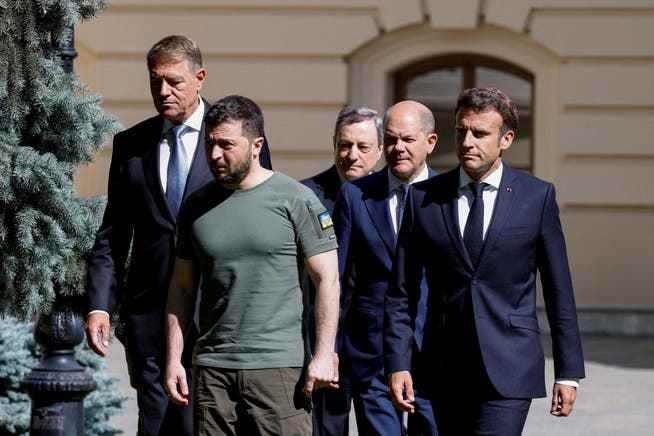The President’s first visit abroad since the beginning of the war comes at a militarily and politically sensitive time. What is unclear is not so much the fundamental need for support for the beleaguered country, but rather the associated strategic goal.
President of Ukraine presents Nancy Pelosi with a Ukrainian flag from the Bakhmut Fortress.
The road from Bachmut to Washington is difficult. But Volodymyr Zelensky deliberately chose it for his first trip abroad since the beginning of the Russian invasion: he brought his most important ally a war flag with him from the Ukrainian “Fortress Bakhmut”, the most dangerous place on the 1300-kilometer-long front, in order to express the need for it with a symbolic gesture to demonstrate additional military aid.
The President of Ukraine, who is bringing home a US pledge to deliver a Patriot battery, felt the direct appearance was particularly necessary this time. The situation in wintry Ukraine is difficult, the Russian attacks on the energy infrastructure put morale to the test, as does the constant artillery shelling in the Donbass. Added to this is the concern that Western supporters could become war-weary.
latent skepticism
This is not unjustified: Biden’s billions for Ukraine are increasingly facing opposition from parts of the opposition Republicans. Even parts of Biden’s team are skeptical about Kiev’s call to deliver even more modern weapons and more ammunition. In addition, there are fears, especially among Western European NATO partners, of an escalation of the conflict with Russia.
The basic problem is the only superficial agreement on the goal of Western military aid: It is to supply Kyiv with enough arms so that Russia does not win. What this means in the longer term remains unclear. In any case, many capitals are skeptical about Ukrainian ambitions to recapture all areas occupied by Moscow, including Crimea. President Biden also made Selenski on Wednesday according to the Washington Post clear that Washington is considering various scenarios.
American leadership remains as important as Zelensky’s charisma in maintaining the Western-Ukrainian united front. This is also because Europeans remain ambivalent about fundamental strategic issues. Berlin is reluctant to make public statements, while President Macron regularly speaks of the need to give Russia security guarantees. That goes down badly in Kyiv. The fear of being pressured into peace by the partners remains present in Kyiv, as does the awareness of the increasing dependence on their help.

No distinction between “good” and “bad” allies: Zelensky in Kyiv with Macron, Scholz, Draghi and Romanian President Iohannis.
This mixed situation forces the Ukrainians to perform a rhetorical balancing act. They need to raise awareness of the dangers to avoid diverting international attention. They must address their demands to specific addressees without alienating them or blunting them through constant repetition.
demonstration of unity
This is not always easy, especially in relation to Germany, as was shown when Federal President Steinmeier was uninvited. However, with the replacement of ambassador Andri Melnik, a more conciliatory style prevailed. In recent months, for example, Zelenskiy has often pointedly mentioned the United States, Great Britain and Germany in the same breath to avoid the impression that he is distinguishing between “good” and “bad” allies.
They are all calling on Kyiv to provide more military aid. The Chief of General Staff Valeri Zalushni recently warned in dramatic terms of an impending Russian offensive and at the same time quantified the need to repel it: “We can beat this enemy”, he told The Economist “But I need 300 tanks, 600 to 700 armored personnel carriers and 500 howitzers.” There are also air defense systems for defending against Russian missiles. Two weeks ago, Foreign Minister Kuleba emphasized the “German leadership” in their delivery – to make it clear in the next sentence that tanks and Patriot systems would have to follow.
element of the unpredictable
Although Selenski always emphasizes that the security of the entire free world is at stake, he remains a petitioner and can ultimately only score points with moral appeals. And even if the imperative of helping Ukraine is undisputed, its intensity depends heavily on the domestic political constellations in individual countries. It thus contains an element of the unpredictable, which even the long-term calculating Vladimir Putin is counting on.
At the same time, it is always the Russians who use their terror to ensure that aid is increased. As a result of the targeted rocket attacks on Ukraine’s infrastructure, air defense systems are no longer seen as “escalation” but rather as a necessary component of a countermeasure against attacks that violate international law and are aimed at civilians.
In addition, these facilitate the division of tasks between the states: Even neutral countries can provide support with generators and transformers. This form of winter and emergency aid is of great importance in an increasingly total war, also strategically. However, it does not change the fact that the war is decided by armies and Kyiv needs more military aid to survive. However, the western alliance would have to be clear about the goal of this. After all, it is the successes of the Ukrainians on the battlefield that politically legitimize this aid in many countries.
